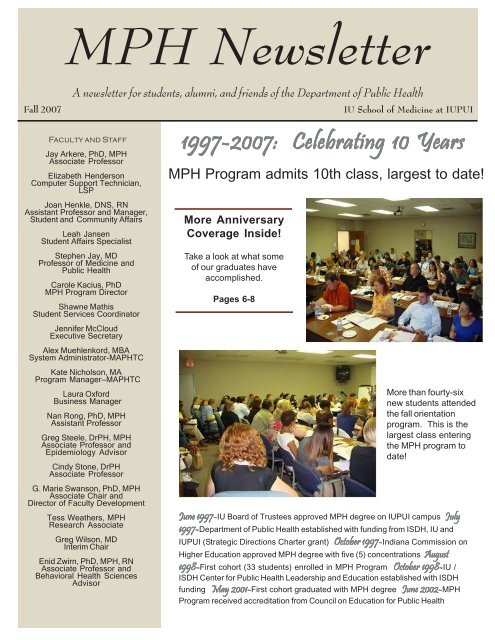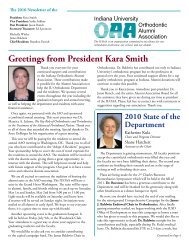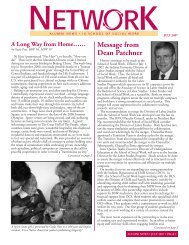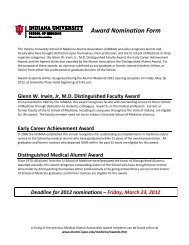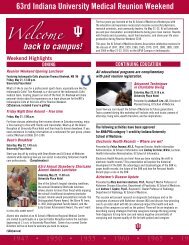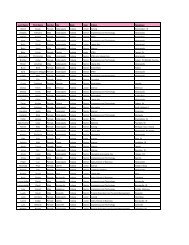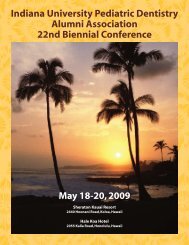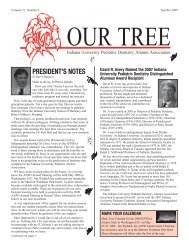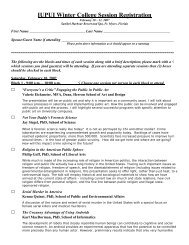Fall 2007.pmd - IUPUI Alumni Relations
Fall 2007.pmd - IUPUI Alumni Relations
Fall 2007.pmd - IUPUI Alumni Relations
Create successful ePaper yourself
Turn your PDF publications into a flip-book with our unique Google optimized e-Paper software.
MPH Newsletter<br />
<strong>Fall</strong> 2007<br />
A newsletter for students, alumni, and friends of the Department of Public Health<br />
Faculty and Staff<br />
Jay Arkere, PhD, MPH<br />
Associate Professor<br />
Elizabeth Henderson<br />
Computer Support Technician,<br />
LSP<br />
Joan Henkle, DNS, RN<br />
Assistant Professor and Manager,<br />
Student and Community Affairs<br />
Leah Jansen<br />
Student Affairs Specialist<br />
Stephen Jay, MD<br />
Professor of Medicine and<br />
Public Health<br />
Carole Kacius, PhD<br />
MPH Program Director<br />
Shawne Mathis<br />
Student Services Coordinator<br />
Jennifer McCloud<br />
Executive Secretary<br />
Alex Muehlenkord, MBA<br />
System Administrator-MAPHTC<br />
Kate Nicholson, MA<br />
Program Manager—MAPHTC<br />
Laura Oxford<br />
Business Manager<br />
Nan Rong, PhD, MPH<br />
Assistant Professor<br />
Greg Steele, DrPH, MPH<br />
Associate Professor and<br />
Epidemiology Advisor<br />
Cindy Stone, DrPH<br />
Associate Professor<br />
G. Marie Swanson, PhD, MPH<br />
Associate Chair and<br />
Director of Faculty Development<br />
Tess Weathers, MPH<br />
Research Associate<br />
Greg Wilson, MD<br />
Interim Chair<br />
Enid Zwirn, PhD, MPH, RN<br />
Associate Professor and<br />
Behavioral Health Sciences<br />
Advisor<br />
IU School of Medicine at <strong>IUPUI</strong><br />
1997-2007: Celebrating 10 Years<br />
MPH Program admits 10th class, largest to date!<br />
More Anniversary<br />
Coverage Inside!<br />
Take a look at what some<br />
of our graduates have<br />
accomplished.<br />
Pages 6-8<br />
More than fourty-six<br />
new students attended<br />
the fall orientation<br />
program. This is the<br />
largest class entering<br />
the MPH program to<br />
date!<br />
June 1997-IU Board of Trustees approved MPH degree on <strong>IUPUI</strong> campus July<br />
1997-Department of Public Health established with funding from ISDH, IU and<br />
<strong>IUPUI</strong> (Strategic Directions Charter grant) October 1997-<br />
Higher Education approved MPH degree with five (5) concentrations August<br />
1998-First cohort (33 students) enrolled in MPH Program October 1998-IU /<br />
October 1997-Indiana Commission on<br />
ISDH Center for Public Health Leadership and Education established with ISDH<br />
funding May 2001-First cohort graduated with MPH degree June 2002-MPH<br />
Program received accreditation from Council on Education for Public Health
Public Health News Page 2<br />
Public Health credentialing exam now available<br />
Credentialing for public health professionals has been discussed<br />
by many professionals in the field. Since the late 1980’s,<br />
stimulated by a call from the U. S. Surgeon General, both the<br />
Association of Schools of Public Health and the American<br />
Public Health Association have been considering ways to credential<br />
workers.<br />
Feasibility studies were conducted in the 1990’s to assess the<br />
interest in a public health certification effort and in January of<br />
2002, ASPH’s Executive Committee approved developing an<br />
independent Board of Public Health to issue examinations and<br />
provide those that pass the exam with a public health credential.<br />
Thus, National Board of Public Health Examiners<br />
(NBPHE) was born and incorporated. The first meeting of the<br />
NBPHE was held in December 2005.<br />
The charge to the NBPHE is to develop, prepare, administer<br />
and evaluate certification examinations for graduates from<br />
Council on Education for Public Health (CEPH) accredited<br />
schools and programs of public health. It is comprised of distinguished<br />
representatives from the Association for Prevention<br />
Teaching and Research (APTR), the Association of State<br />
and Territorial Health Officers (ASTHO), the National Association<br />
of City and County Health Officers (NACCHO), private<br />
sector public health, as well as the American Public Health<br />
Association (APHA) and the Association of Schools of Public<br />
Health (ASPH).<br />
Since their first meeting, the NBPHE has been working on<br />
issues related to developing the exam, eligibility, outreach,<br />
diversity and research and evaluation. The first exam will be<br />
administered August 11-30, 2008. Anyone who graduated or<br />
will graduate on or before July 31, 2008, from a CEPH accredited<br />
school or program will be eligible to take the<br />
credentialing exam.<br />
The exam is being designed to test knowledge of the five areas<br />
basic to public health and cross-cutting areas relevant to contemporary<br />
public health. Questions are based on the core competencies<br />
developed by ASPH and available on the ASPH<br />
website (http://www.asph.org/userfiles/version2.3.pdf). The<br />
exam will be offered at more than 300 testing centers distributed<br />
nationally.<br />
Fees for the exam are based on a sliding scale based on registration<br />
date starting at $300. Those who successfully pass the<br />
exam will be Certified in Public Health. Exam registration<br />
and related news is available at www.publichealthexam.org.<br />
Establishing a public health credential is the result of a 20-<br />
year undertaking and it is hoped that the credential will<br />
strengthen the public health practice and raise awareness of<br />
the important contributions of the public health workforce to<br />
the protecting the nation’s health and safety. The exam is optional<br />
and available to anyone who graduated from an accredited<br />
program or school of public health.<br />
Indiana University<br />
School of Medicine<br />
Department of Public Health<br />
714 N. Senate Avenue, EF 250<br />
Indianapolis, IN 46202<br />
317-274-3126<br />
www.pbhealth.iupui.edu
International News Page 3<br />
Students selected for Honduras Stove Project: Phase III<br />
MPH students Erika Chapman and Megan Buchholz have been selected to participate in the<br />
Honduras Stove Project this spring. Both are behavioral health science students who have an<br />
understanding and appreciation of the interrelationships of the biological, psychosocial and<br />
environmental factors of health and disease. But most importantly, according to Dr. Joan<br />
Henkle, principal investigator for the study, both students have a great desire to learn, are<br />
flexible, can adapt to change, and have positive attitudes.<br />
In May, 2007, Phase II of the Stove Project was initiated in the rural village of Sabanas,<br />
Talube, Honduras. The objectives of Phase II included collecting baseline data on respiratory<br />
health, total suspended particulates (TSP), carbon monoxide (CO), an environmental survey<br />
and the construction of a prototype stove. Stoves will be installed in every house in Sabanas<br />
(n=34) this fall and Megan and Erika will travel to Sabanas in February 2008, to collect data,<br />
post stove installations.<br />
To the left is a picture of the Justa stove that has been selected and installed in one home in<br />
Sabanas. In the control home, the average CO reading was 12.818 ppm with maximum reading at 26.5 ppm. After the stove<br />
installation, the average CO reading was 0.5 ppm with the maximum reading at 3.5 ppm. A dramatic 2563.6% decrease in<br />
average CO!<br />
Contributions for stove project still being accepted<br />
Thanks to our MPH graduates and friends of our MPH Program, we are well on the way to meeting our goal of installing a<br />
stove in all 34 homes in Sabanas, Honduras! So far, over $2,500.00 has been contributed to this project. Our goal is to raise<br />
$3,400.00 ($100.00 per stove) and any money over this target will assist the public health students with their expenses. If you<br />
wish to contribute to this public health project, please fill out the attached form or follow the instructions to contribute online.<br />
Thank you all for your generosity!<br />
<br />
Yes!<br />
I would like to make a tax-deductible contribution to support the IU Department of Public<br />
Health’s Global Health & International Medicine: Honduras Lorena Stove Project!<br />
To contribute online, please go to www.pbhealth.iupui.edu and click on “Make a Donation” located on the left side, then<br />
click on “fill in gift amount” located on the far right side of the screen. You may add a comment such as “Honduras stove<br />
project” under additional comments if you wish. Or send this form and a check payable to:<br />
Indiana University School of Medicine<br />
C/O Indiana University Foundation<br />
PO Box 660245<br />
Indianapolis, IN 46266-0245<br />
I would like to buy: 1 stove ($100) 2 stoves($200) 3 stoves($300) 4 stoves ($400)<br />
I would like to contribute to this project: $75 $50 $25 $10 $5<br />
Name: _____________________________________________________________________________________________________<br />
Address:___________________________________________________________________________________________________<br />
City: __________________________________________________ State: ______________ Zip: __________________________<br />
Phone: ______________________________________________ Email: _____________________________________________
Department News Page 4<br />
This <strong>IUPUI</strong> billboard features<br />
our ‘07 MPH graduate and<br />
H517: Fundamentals of Epidemiology<br />
Teaching Assistant<br />
Debbie Morrison.<br />
MPH student serves with AmeriCorps<br />
By Patrick Sweany<br />
In July of 2007, I was accepted to serve<br />
in the AmeriCorps program, as a Public<br />
Health Researcher, at the Indiana<br />
State Department of Health. For the<br />
following months ahead, I will be assisting<br />
the HIV/STD Division administer<br />
with a statewide assessment project to determine current<br />
HIV screening practices within hospital Emergency Departments.<br />
Recently, the Centers for Disease Control and Prevention<br />
(CDC) released recommendations that HIV testing be<br />
offered routinely in traditional healthcare settings including<br />
Emergency Rooms. There are several barriers in place that<br />
need to be addressed prior to the implementation of routine<br />
HIV testing. The project’s plan is to identify and address those<br />
barriers unique to Indiana with the assistance and collaboration<br />
from public health and healthcare professionals throughout<br />
the state.<br />
At this point, the focus is on routine HIV testing in Emergency<br />
Departments. If time permits, the project will explore other<br />
venues for routine testing, particularly urgent care clinics.<br />
statewide assessment project to determine current HIV screening<br />
practices within hospital Emergency Departments. Recently,<br />
the Centers for Disease Control and Prevention (CDC)<br />
released recommendations that HIV testing be offered routinely<br />
in traditional healthcare settings including Emergency<br />
Rooms. There are several barriers in place that need to be<br />
addressed prior to the implementation of routine HIV testing.<br />
The project’s plan is to identify and address those barriers unique<br />
to Indiana with the assistance and collaboration from public<br />
health and healthcare professionals throughout the state.<br />
The assessment project is divided into three parts as follows:<br />
1.Statewide assessment of Emergency Departments current<br />
practices concerning HIV testing in Emergency Rooms.<br />
--Survey Distribution to E. D. Directors via e-mail.<br />
2. Obtain a legal opinion regarding consent and counseling for<br />
HIV screening.<br />
--Will new “oral and/or written consent” requirements<br />
prevent hospitals from using opt-out screening?<br />
--Is pre-test and/or post-test counseling required<br />
under current Indiana statute?<br />
Over the past month, I had the opportunity to network with<br />
other AmeriCorps members across the state through volunteer<br />
efforts at the Indiana Black Expo. I am grateful and honored<br />
to receive the status of AmeriCorps member and will<br />
work hard to address the public health challenges confronting<br />
us right here in our state of Indiana. ISDH is administering a<br />
3. Insurance Coverage Assessment<br />
--Determine which health insurance plans would cover<br />
routine HIV testing.<br />
At this point, the focus is on routine HIV testing in Emergency<br />
Departments. If time permits, the project will explore other<br />
venues for routine testing, particularly urgent care clinics.
Two new faculty members join the Department<br />
The Department of Public Health is pleased to announce two<br />
new faculty members.<br />
Dr. Nan Rong<br />
Dr. Nan Rong studied at University of<br />
Rochester for her Master’s degree in Public<br />
Health from 1998 – 2000. In 2003, she<br />
was awarded a doctoral degree in Health<br />
Services Research and Policy from University<br />
of Rochester. Dr. Rong worked at<br />
Yale University School of Medicine before<br />
returning to China, her native country, to<br />
work at Tsinghua University School of<br />
Public Policy and Management and the<br />
Chinese Center for Disease Control and Prevention.<br />
Trained as a health services researcher, Dr. Rong has conducted<br />
research concerning the geographic variations in Medicare<br />
end-of-life care spending, racial differences in the quality<br />
of cardiac care, and the use of advance directives in the<br />
elderly. As a researcher, she has a strong background in research<br />
methodology, mathematical modeling, and data management.<br />
She also has advanced programming skills in SAS<br />
and STATA.<br />
In the fall of 2006, Dr. Rong moved to Indianapolis and started<br />
teaching as an adjunct faculty member in the Department of<br />
Public Health at Indiana University.<br />
This fall, Dr. Rong will be teaching Strategic Management in<br />
Health Care. She will also teach Health Care Research Methodology<br />
for the second time. Her broad teaching interests include<br />
fundamentals of epidemiology, health care system, research<br />
methods, statistics and computational skills. She looks<br />
forward to exciting future teaching opportunities as the department<br />
keeps growing.<br />
Department News Page 5<br />
Dr. Jay Arekere<br />
Dr. Jay Arekere is the former Interim<br />
Director of the Center for the Study of<br />
Health Disparities at Texas A&M University,<br />
College Station, TX. He is<br />
currently Associate Professor in the Department<br />
of Public Health, IU School of<br />
Medicine, Indianapolis, Indiana. His research<br />
and teaching expertise are in the<br />
areas of social determinants of health,<br />
health disparities, health policy and politics,<br />
health economics, rural health and international health.<br />
Dr. Arekere’s educational background includes B.S. in Agricultural<br />
Sciences (Agricultural Economics), MS in Forestry<br />
(Forest Economics), MS in Agricultural Economics (Resource<br />
Economics), a Graduate Certificate in International Agriculture<br />
and Resource Management, and PhD in Agricultural Economics;<br />
and a MPH in Health Policy and Management.As<br />
interim director of the Center for the Study of Health Disparities,<br />
Texas A&M University, Dr. Arekere was instrumental<br />
in working with faculty in the Division of Health, and the Center<br />
for Community Health Development and the School of Rural<br />
Public Health, TAMHSC to submit a 5-year, $6.87 mil grant<br />
application to the National Center on Minority Health and<br />
Health Disparities, NIH, toward the Establishing Exploratory<br />
NCMHD Research Centers of Excellence (RFA-MD-06-003).<br />
This grant application with Dr. Kenneth McLeroy as PI has<br />
been approved for funding and includes a $1.5 mil research<br />
project to be headed by Dr. Arekere as PI, Student Wellness<br />
Assessment and Advocacy Project (SWAAP) to address childhood<br />
obesity in Texas. The overall objective of the SWAAP is<br />
to comprehensively assess the various determinants of childhood<br />
obesity in comparative rural and urban settings, and use<br />
the information to design, implement and evaluate the efficiency<br />
and effectiveness of a tailored intervention.<br />
MPH <strong>Alumni</strong> Association kick off the fall season<br />
The IU Department of Public Health MPH Program <strong>Alumni</strong> Association kicked off this fall season with a lunch meeting at<br />
Harry & Izzy’s, a downtown restaurant, on Thursday, September 20 th . The Association will discuss ways to further the<br />
professional, educational, and social interests of the MPH Program and its <strong>Alumni</strong>, both individually and collectively. For<br />
future news, please visit our website at http://alumni.iupui.edu/medicine/mph.htm<br />
Joan Henkle, DNS, RN – MPH Faculty Liaison<br />
Jayme Little, MS, Ed - <strong>IUPUI</strong> Director, <strong>Alumni</strong> Programs<br />
Gurinder Hohl, MPH – MPH <strong>Alumni</strong> Association President<br />
Bobbi Van Der Pol, PhD, MPH – MPH <strong>Alumni</strong> Association-Past President
2001: Kristine A. Madsen, MD, MPH<br />
<strong>Alumni</strong> News Page 6<br />
1997-2007: Celebrating 10 Years<br />
What are our alumni doing now?<br />
Dr. Madsen is a pediatrician and research scientist at the University of California, San Francisco, with expertise in the design<br />
and evaluation of interventions related to pediatric obesity. Her advanced training in clinical obesity, public health and clinical<br />
research supports a broad-based prevention approach to pediatric health problems. Among her accomplishments, Dr. Madsen<br />
has directed clinic and community based studies aimed at increasing physical activity and reducing obesity among children of<br />
diverse backgrounds. She has coordinated the collection of anthropometric and survey data from over 300 students in 9 San<br />
Francisco elementary schools.<br />
Dr. Madsen is also affiliated with U.C. Berkeley’s Center for Weight and Health (CWH) where she is leading the analysis<br />
team examining the relationship between children’s activity and the development of obesity in the Center’s 10-year longitudinal<br />
study, the NHLBI Growth and Health Study. She is also part of the Center’s team evaluating the Kaiser-funded Healthy Eating<br />
and Active Living initiative, a community-led effort to improve access to affordable, healthy foods and promote active lifestyles,<br />
thereby reversing the growing trend of obesity. Furthermore, she is leading the Center’s evaluation of the fitness/physical<br />
activity data from the 19 intervention and control schools participating in The California Endowment’s Healthy Eating, Active<br />
Communities (TCE-HEAC) initiative to prevent childhood obesity. TCE-HEAC aims to improve the nutrition and physical<br />
activity environments in six low-income communities in California. Dr. Madsen is the Principal Investigator on a grant from<br />
the National Institute of Child Health and Human Development to conduct a randomized controlled trial of a national afterschool<br />
program promoting literacy and physical activity among minority youth.<br />
2002: Amanda Overgaard, MPH<br />
Since the completion of her MPH degree with a concentration<br />
in Epidemiology, Amanda worked as the manager of a<br />
practice-based research network and subsequently began<br />
medical school at Indiana University in 2004. She is currently<br />
in her final year of medical school and will be entering<br />
her pediatrics residency next fall.<br />
According to Amanda, the most significant benefit of her<br />
MPH has been the background obtained in research methodology<br />
and evidence-based medicine. As a future physician,<br />
her MPH training has prepared her with research skills<br />
that will enable her to further contribute to the medical profession<br />
by integrating epidemiologic research into her practice.<br />
Additionally, evidence-based medicine is a clinically<br />
important discipline and the application of evidence-based<br />
principles facilitates critical assessment of literature to ultimately<br />
provide the most “up-to-date” care for her future<br />
patients.<br />
Finally, the population and public health based perspective<br />
she gained during her MPH education increased her awareness<br />
of public health aspects of medical issues, particularly<br />
as it pertains to children, and has significantly influenced<br />
her goals and philosophy regarding her career choice of<br />
pediatrics as well as her overall practice of medicine.<br />
We want to hear from you!<br />
Moving? Changing jobs?<br />
Drop us a line to let us know your current contact information so we can stay in touch!<br />
Send updates to Leah Jansen at lwissel@iupui.edu.
<strong>Alumni</strong> News Page 7<br />
1997-2007: Celebrating 10 Years<br />
What are our alumni doing now?<br />
2003: Calvin E. Roberson Jr., MHA, MPH<br />
Calvin E. Roberson Jr. has been a public health professional<br />
since 1997. He is currently the Vice President of Research<br />
and Training for the Indiana Minority Health Coalition, Inc.,<br />
(IMHC), in Indianapolis, Indiana. He has extensive experience<br />
in program design, development, and implementation,<br />
project coordination and administration, educational didactics<br />
and training, and client recruitment and retention.<br />
He also has experience in epidemiological research, which<br />
includes program evaluation and statistical analysis. Calvin<br />
has presented at both local and state conferences, as well as<br />
other public events.<br />
Prior to his current position at IMHC, Calvin was the Research<br />
Director for the IMHC Racial & Ethnic Minority<br />
Epidemiology (REME) Center, the Regional Training Coordinator<br />
for the IMHC Training Center, and Project Coordinator<br />
for the IMHC REME Center.<br />
In addition, Calvin was a former Adolescent Health Educator<br />
for the Health and Hospital Corporation of Marion County.<br />
Calvin holds dual Masters Degrees in Health Administration<br />
and Public Health. Calvin currently holds a position on<br />
the IN MAPHTC<br />
Advisory Board.<br />
2004: Tanya Parish, MPH<br />
Tanya has been working at the Indiana State Department of Health since 2000, but it wasn’t<br />
until 2004 that she completed her MPH degree at <strong>IUPUI</strong>. Going to graduate school while<br />
working full time, getting married, and starting a family was no easy task, but she is so glad<br />
she did it…and survived! Working in the field of public health at the same time that she was<br />
earning her degree was extremely beneficial because it allowed her to immediately apply<br />
what she was learning in the classroom to real-life public health issues.<br />
Obtaining her MPH degree and C.H.E.S certification has allowed her to move up in the<br />
health department and take on some new and exciting positions. As she wrapped up her<br />
degree, she applied for and was hired as the Coordinated School Health Program Director,<br />
which allowed her to combine her knowledge and skills in public health with her passion for<br />
improving the lives of children. She was also responsible for coordinating the 2005 and<br />
2007 Indiana Youth Risk Behavior Surveys that provide state data on the behaviors of Hoosier<br />
adolescents in six health areas. After Governor Daniels launched INShape Indiana,<br />
she was asked by the Deputy State Health Commissioner to serve as the Director of this<br />
exciting statewide health initiative.<br />
She was also asked to head up the ISDH Wellness Council in an effort to promote health and wellness among health department<br />
staff and to share worksite wellness ideas with other state agencies, businesses, and organizations. Most recently the<br />
Deputy Health Commissioner asked her to take on another very exciting role, and she now serves as the Director of the Office<br />
of Women’s Health. This office focuses on many important women’s health issues and works closely with the First Lady’s<br />
Office on her Heart to Heart initiative.<br />
Even though her coursework is complete, she continues to seek out professional development opportunities so that she can<br />
expand her knowledge and skills in the field of public health. As an alumnus, she has maintained an ongoing relationship with<br />
the Department of Public Health and has hosted several MPH interns and student groups. Tanya notes that obtaining her MPH<br />
degree has been an extremely important aspect of her advancing career in public health, not only because of the knowledge<br />
and skills she gained, but also the personal relationships she fostered with the faculty, alumni, and staff in the Department of<br />
Public Health.
<strong>Alumni</strong> News Page 8<br />
1997-2007: Celebrating 10 Years<br />
What are our alumni doing now?<br />
2005: Michael Wade, MPH<br />
Since graduating from the MPH program in 2005, Mike has<br />
served as the syndromic surveillance epidemiologist at the<br />
Indiana State Department of Health (ISDH), and leads<br />
Indiana’s Public Health Emergency Surveillance System<br />
(PHESS). In plain English, you say?<br />
Mike monitors health data, primarily hospital emergency department<br />
patient chief complaint data, for the purposes of<br />
the early detection of bioterrorism events, naturally occurring<br />
disease outbreaks, and other potential public health emergencies.<br />
In addition to the quantitative, data-oriented aspects<br />
of his work, Mike’s efforts include enabling local health department<br />
and hospital personnel access to syndromic surveillance<br />
data, securing additional syndromic data sources, facilitating<br />
syndromic data sharing with Indiana’s border states,<br />
and institutionalizing standardized syndromic surveillance response<br />
processes/procedures.<br />
Mike believes wholeheartedly in the importance of contributing<br />
to public health through writing peer reviewed publications,<br />
and credits the MPH program at the IU School of<br />
Medicine with helping him hone the necessary skills. With<br />
outstanding support and from his internship and final project<br />
preceptor teams, Mike was able to publish in Family Medicine<br />
his final research project, “Influence of Hometown on<br />
Family Physicians’ Choice to Practice in Rural Settings”.<br />
Further, working with his ISDH PHESS team, the<br />
Regenstrief Institute, and the Marion County Health Department,<br />
Mike has been able to participate in the development<br />
and presentation of numerous abstracts.<br />
2006: Kim Irwin, MPH, CHES<br />
Kim Irwin, MPH, CHES, graduated from the Department of Public Health in 2006 with a concentration<br />
in Behavioral Health Science. She now works for the American Lung Association of Indiana as<br />
a Health Promotions Manager. Kim’s work includes education, program management and community<br />
relations related to asthma, tobacco control, COPD, and air quality.<br />
Kim’s favorite aspect of the program was participating with local organizations and agencies in<br />
“real-world, hands-on” projects to improve health and quality of life. “I met so many neat people<br />
and have developed great professional and personal relationships as a result of the MPH program!”<br />
2007: Sarah Wortz, MPH<br />
Sarah has been the Public Health Preparedness Coordinator for the Hendricks County<br />
Health Department since June 2004. Prior to that, she worked as a health educator.<br />
She received her undergraduate degree in Public Health from Western Kentucky University<br />
in 2003. Sarah graduated with her Master of Public Health degree in Epidemiology<br />
and Behavioral Health Science in May 2007. She recently became a resident of<br />
the Hendricks County area with her fiancé Jason and their dog ‘Bella’.<br />
Since graduation she has continued to work in preparedness. Her three years in the<br />
program provided her with the opportunity to meet so many wonderful people. She<br />
notes that the opportunity for networking was great and being in the program has provided<br />
her with so much. She looks forward to working in the field of epidemiology at<br />
some point and having the background and knowledge that the program has provided<br />
will hopefully open up opportunities to do just that.
Notes and Updates Page 9<br />
Meet Our Adjunct Faculty: Dr. Michael Kowolik<br />
Dr. Michael Kowolik is the Associate<br />
Dean for Graduate Education, Professor<br />
of Periodontics, Adjunct Professor of<br />
Oral Biology and Oral Facial Genetics<br />
(School of Dentistry), and Adjunct Professor<br />
of Public Health (School of Medicine).<br />
Dr. Kowolik earned his dental degree and<br />
PhD from the University of Edinburgh and<br />
obtained his Fellowship in Periodontology and Preventive Dentistry<br />
at the Royal College of Surgeons of Edinburgh. After<br />
serving as an Honorary Consultant and Head of Clinical Periodontology<br />
at the University of Leeds for nearly 10 years, he<br />
became an Adjunct Professor at IUSD and a Research Fellow<br />
with the Procter and Gamble Company.<br />
Dr. Kowolik is an active teacher and has made well over 100<br />
presentations at international meetings and other universities.<br />
He is also an active researcher and is successfully competing<br />
in the research funding arena with several past contracts and<br />
grants, currently including an R01 grant from the NIH. He has<br />
published the results of his research in 60 peer-reviewed publications,<br />
and these are in addition to his numerous book chapters<br />
and review articles. Dr. Kowolik is also active in school,<br />
professional and university service responsibilities including<br />
membership on the <strong>IUPUI</strong> Graduate Affairs committee, the<br />
IU Graduate Council and the Advisory Committee in the <strong>IUPUI</strong><br />
General Clinical Research Center. He holds several adjunct<br />
and affiliate appointments at <strong>IUPUI</strong>, including those in The<br />
Department of Public Health and The Indiana Center for Bioethics.<br />
At the dental school, he is responsible for monitoring the standards<br />
for IUSD graduate programs, student qualifications, recruitment,<br />
admissions, and general performance. He also will<br />
be responsible for assisting the graduate program directors in<br />
coordinating all aspects of the education, training and research<br />
performed by the graduate students, as well as support services<br />
for these programs and students. In the Department of<br />
Public Health, Dr. Kowalik team-teaches P600: Epidemiologic<br />
Research Methods with Dr. Indiana Strombom.<br />
Meet Our Staff: Shawne Mathis<br />
The Student Services Coordinator, Shawne Mathis has worked with the Department of Public<br />
Health since the first entering class of MPH students in 1998. Shawne is excited about having the<br />
opportunity to be part of a growing program. Her favorite part of her position is working with the<br />
students. She finds gratitude in networking with students, staff and faculty. It has been a pleasure<br />
to be a part of this experience and she looks forward to her continued work with the department in<br />
the future as the department works towards establishing a School of Public Health.<br />
Shawne has earned Bachelors in General Studies with a concentration in Social and Behavioral<br />
Science. Shawne has been a foster parent for eight years and has adopted two girls and recently a<br />
two year old boy. She enjoys camping, reading, traveling, attending church and spending time<br />
with her growing family.<br />
Shawne is a key person in the department and serves the students and faculty with a warm smile and kind heart. The MPH<br />
Program is fortunate to have Shawne on board!
IN MAPHTC Page 10<br />
IN MAPHTC is working for Indiana’s public health professionals<br />
Indiana Mid-America<br />
Public Health Training<br />
Center (IN MAPHTC) is<br />
dedicated to the<br />
improvement of public<br />
health practices<br />
through education and training. We are truly<br />
committed to helping Indiana’s public health<br />
workforce connect, learn, and act. We’re growing so<br />
we can better meet the needs of those we serve. It’s<br />
an exciting time to be a part of IN MAPHTC!<br />
Connect. IN MAPHTC offers a variety of educational<br />
opportunities, including online courses, on-site<br />
sessions, resource connections, and multi-media<br />
productions. Whether you’d like to attend a face-to<br />
face session or prefer an online course, we provide<br />
the opportunity to connect with relevant information,<br />
research, and other public health professionals.<br />
Learn. We provide meaningful, relevant continuing education<br />
opportunities in order to enhance the ability of Indiana’s public<br />
health professionals to adapt in a constantly changing<br />
environment. We offer a full portfolio of educational options<br />
to public health professionals.<br />
Act. IN MAPHTC serves as a vehicle for collaboration among<br />
Indiana’s public and private agencies and professionals to<br />
enhance shared knowledge and cooperation. We also seek to<br />
improve Indiana’s public health infrastructure by providing a<br />
network in which agencies can share and maximize resources.<br />
We’re here to serve you! Please don’t hesitate to contact the<br />
IN MAPHTC staff with any questions, comments, or ideas you<br />
may have. We look forward to working with you soon.<br />
Intro to Program Planning participants pilot certificate program<br />
Over twenty-five public health professionals attended the Introduction to<br />
Program Planning for Public Health Organizations series held in August.<br />
This course served as a pilot program for a non-credit online certificate in<br />
Program Planning to be launched in early 2008.<br />
Topics covered in the series included an introduction to public health;<br />
overview of health belief models and social theories; planning programs;<br />
implementation of six types of programs; evaluation; and promotion. Each<br />
topic included a presentation, resources, and discussion.<br />
Participants in the Program Planning series<br />
explore concepts through group activities. “Great<br />
ahead-of-the-curve thought process,”commented<br />
one participant.<br />
Many of the live session<br />
participants are also<br />
piloting the online<br />
certificate program. The online program includes topics covered in the live<br />
session, as well as advanced information on goal setting, presentations,<br />
marketing, grant writing, and using technology.<br />
Interested in learning more about program planning? Email<br />
maphtc@iupui.edu and request the Program Planning Essentials for Public<br />
Health Providers CD-ROM free of charge.<br />
Public health professionals in a variety of<br />
organizations worked together throughout<br />
the series. Participants remarked on the<br />
variety of topics presented.
IN MAPHTC Page 11<br />
New series of online bioterrorism courses available<br />
IN MAPHTC and the Indiana State Department of Health have recently launched a 12 module online series to assist<br />
hospital bioterrorism/preparedness personnel. Course content was determined by a needs assessment conducted<br />
with hospital staff. Each course is user-friendly, includes information from national experts, and offers pratical tips.<br />
Courses can be accessed free of charge through the Indiana Learning Management System (LMS), www.inlms.com.<br />
Every module concludes with a quiz and participants can download a certificate of completion after successfully<br />
completing the learning exercise.<br />
Radiological Terrorism: Just in Time Training for Hospital Clinicians (CDC) (HBT010507)<br />
The content of the training is based on a brief, 17-minute video covering key radiation principles and radiological procedures. It<br />
includes demonstrations on application of several patient care scenarios in an emergency services setting.<br />
Decontamination of Children-Preparedness and Response for Hospital ER’s (HBT020507)<br />
This program provides a step-by-step demonstration of the decontamination process and trains clinicians about the nuances of<br />
treating infants and children, who require special attention during decontamination.<br />
Systems or Symptoms? Finding the Right Balance in Preparing for Emergencies (HBT030607-- Module A;<br />
HBT040607--Module B)<br />
Much health emergency training focuses on the signs, symptoms, and treatment of the long list of biological, chemical, and<br />
radiological agents that may be used to cause terror or harm. However, it is important to understand these signs and symptoms and<br />
how they are associated with preparedness education.<br />
Managing Contemporary Mass Fatality Incidents (HBT050807-- Module A; HBT060807--Module B)<br />
The presenter provides an overview of the new challenges posed by incidents that result in more deaths than are manageable with<br />
locally available resources.<br />
When the System is Overwhelmed: Protecting the Provider During Biodisaster (HBT070807--Module A;<br />
HBT080807--Module B; HBT090807--Module C)<br />
This module covers the dynamics of healthcare change when massive demands are made on healthcare systems, particularly when<br />
providers are put at risk themselves. This presentation looks at the impact of various public health disasters on the system and the<br />
emotional dynamics of caretakers.<br />
Hospitals, Treatment Centers, and Public Health: Parters in Emergency Planning and Response (HBT100807--<br />
Module A; HBT110807--Module B; HBT120807--Module C)<br />
During a public health emergency or natural disaster, treatment centers, such as hospitals, nursing homes, and long-term care<br />
facilities, may be taxed beyond their capacities. This course focuses on many of the issues facing both public health planners and their<br />
local treatment center partners.<br />
IN MAPHTC<br />
IU School of Medicine<br />
Dept. of Public Health<br />
714 North Senate Street<br />
EF 250<br />
Indianapolis, IN 46202<br />
317.274.3178 p<br />
317.274.3443 f<br />
connect• learn• act•<br />
Indiana Mid-America Public Health Training Center (IN MAPHTC) is dedicated to<br />
the improvement of public health practices for the health, safety, and welfare of<br />
Hoosiers through education and training. IN MAPHTC offers a variety of<br />
educational opportunities, including online courses, on-site sessions, resource<br />
connections, and multi-media productions. IN MAPTHC is part of 14 nation-wide<br />
HRSA funded centers through its partnership with the University of Illinois at


